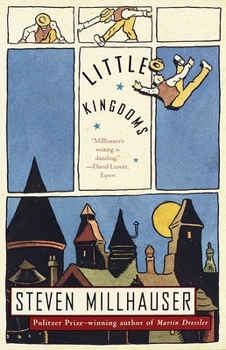Little Kingdoms
Select Format
Select Condition 
Book Overview
The Pulitzer Prize-winning author of Martin Dressler delivers an inventive collection of three novellas that are a magical companion to his acclaimed longer fictions. - "Millhauser makes our world turn amazing " --The New York Times Book Review
Cartoons that draw their creator into another world; demonic paintings that exert a sinister influence on our own. Fairy tales that express the secret losses and anxieties of their...
Format:Paperback
Language:English
ISBN:0375701435
ISBN13:9780375701436
Release Date:February 1998
Publisher:Vintage
Length:240 Pages
Weight:0.60 lbs.
Dimensions:0.6" x 5.2" x 8.0"
Customer Reviews
5 ratings
Disturbing and delightful
Published by Thriftbooks.com User , 16 years ago
With Little Kingdoms, Steven Millhauser proves his fantasy mettle once again. The three novellas, excellent in their various ways, kept me glued to the pages. Admittedly, the first story was a bit plodding (hence the four star rating), but I absolutely devoured the last half of the book. Of Millhauser's writing: what can be said? The stories are fantastic in their simplicity, which somehow has a tendency to become sinister, dark, and compelling. This is not Millhauser's most accessible collection (The Barnum Museum or In The Penny Arcade takes that title), but for fans of the author, this is quite the treat.
Another gem from Millhauser
Published by Thriftbooks.com User , 17 years ago
It's been a while since I've read anything by Steven Millhauser. I jumped into his short stories several years ago with the collections The Knife Thrower and The Barnum Museum, got a good feel for his style (which I liked), and moved to other books in my stack. I have certainly felt Millhauser's pull since that time, and I couldn't ignore it any longer. LITTLE KINGDOMS was an excellent choice for getting back into his work. The three novellas comprising LITTLE KINGDOMS are thematically related, in that they all showcase how art at first replaces reality, and then assumes it. In "The Little Kingdom of J. Franklin Payne", a newspaper cartoonist turns to animated side-projects to escape from his unsatisfying life. Millhauser works wonders with this tale, effectively capturing the spirit of comic strips and animation in the early 20th Century and bringing them to surprising life. "The Princess, the Dwarf, and the Dungeon" shows how we shape our own mythologies, and how they in turn shape us. By the end of the tale, the two perspectives are merged into an astounding whole. Finally, "Catalogue of the Exhibition: The Art of Edmund Moorash (1810 - 1846)" uses the descriptions of an artist's paintings to tell the artist's life story, and what descriptions they are. The catalogue format enables Millhauser's creativity to run free, creating objects that might be too unsettling or terrifying to view in real life. While it is not essential to read these novellas together, I feel that doing so shows how Millhauser effectively uses different styles of writing to present a single theme. In addition, there is another common theme of relationships in distress. To go much further into this might ruin the stories, but I will say that the main characters in these three novellas do not have healthy relationships with their loved ones. But for all the problems present with the main characters, they sure do make for fascinating subjects.
Picturesque Tales
Published by Thriftbooks.com User , 22 years ago
The first of the three novellas that comprise this book, The Little Kingdom of J. Franklin Payne, is by itself worth the price of admission. Unusually direct for Millhauser, the story of an obsessed cartoonist in turn of the century New York engages the emotions as well as the intellect, creating a quietly heartbreaking family portrait while vividly depicting the joys and agonies of iconoclastic creativity. The Princess, the Dwarf, and the Dungeon is a yet another post-modern fairy tale, but after a slow start becomes quite intriguing, let down only by an overly facile conclusion.Catalogue of the Exhibition is a brilliant idea -- the story of an artist and his circle told in the catalogue for an exhibition of his work -- and seems perfect for Millhauser, whose love for (and skill at) describing invented painting and drawing seemingly knows no bounds, yet this novella disappoints. The "Catalogue" idea seems tacked on as the entries grow to fill pages barely about the painting at hand, and the story never quite punches through the conceit. But we do get some wonderfully spooky descriptions of Lovecraftian canvases.Millhauser's certainly an acquired taste and not for everyone, but if you've enjoyed any of his other work this collection, particularly its fine first tale, will likely please.
Wonderful Stories
Published by Thriftbooks.com User , 23 years ago
I've read several of Millhauser's books, and the first (and longest) novela in this book is one of my favorite. It's about a cartoonist who begins creating animations in the 1920's. He becomes more and more obsessed... wonderful descriptions of his drawings... but his interactions with his wife and daughter are touching and very sad. This story will have a lasting effect.
The Readers of Steven Millhauser
Published by Thriftbooks.com User , 23 years ago
Readers of the mysterious work of Steven Millhauser are sometimes themselves a mystery. Look, for example, at some readers' extremely negative reactions to his prize-winning "Martin Dressler." What accounts for this? Perhaps this is a class of readers who trail the Pulitzer Prize committees and choose their books based only on who wins. How odd and superficial. Again and again, such know-nothings find their narrowly traditional notions of what a novel is betrayed by Millhauser. Mr. Millhauser, keep it up!






